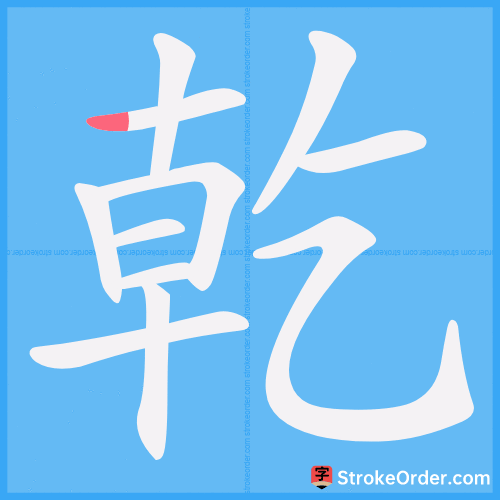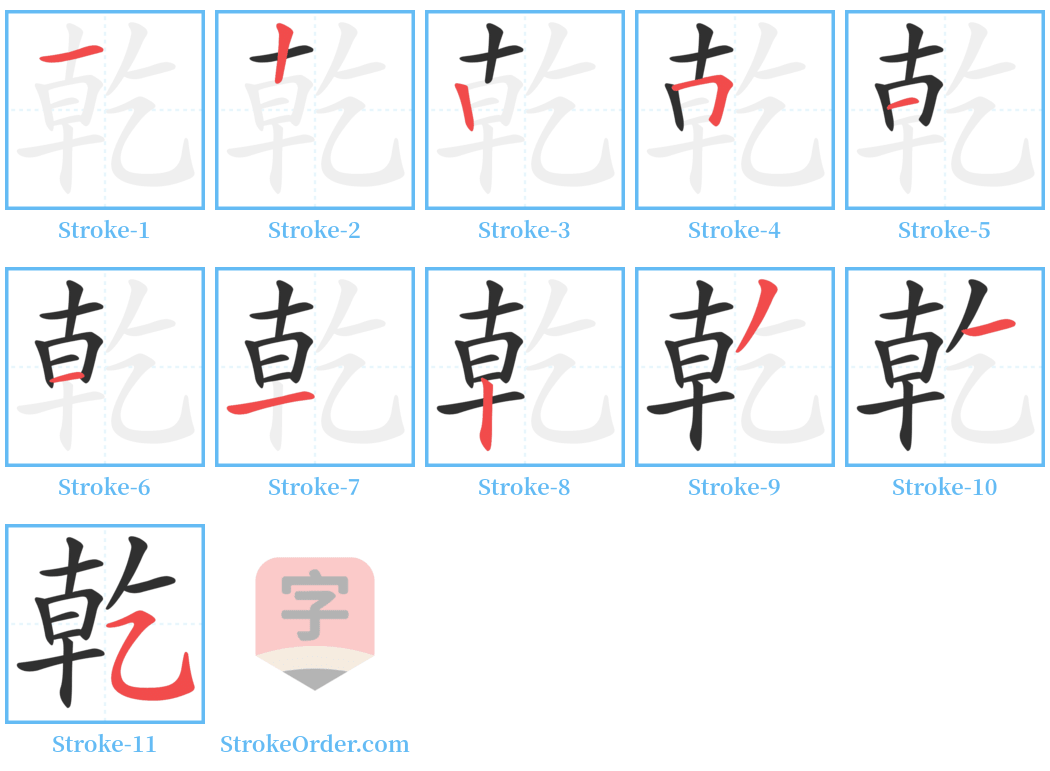乾 Stroke Order
Animated Stroke Order of 乾

Stroke Order Diagrams for 乾

Step-by-Step Handwriting Guide for 乾

Learn to Write Chinese Characters with Video Tutorials
Watch the video of writing the Chinese character "乾", learn the correct stroke order (笔顺) of the character "乾", and master the standard way of writing the character "乾".
Free Printable Handwriting Practice with Stroke Order: 乾
Printable Writing Practice Worksheet of "乾" in Portrait Orientation (Tian Zi Ge)

Printable Writing Practice Worksheet of "乾" in Landscape Orientation (Tian Zi Ge)

Information of 乾
Pinyin
qián、 gān
Radical
乙
Strokes
11 strokes
Usage
★★★★★
Definition
dry, (surname) / male / strong / one of the Eight Trigrams
乾 [qián]
1. 八卦之一,代表天。
The first of the Eight Diagrams, representing the sky.
2. 旧时称男性的。
Formerly referred to men.
---
乾 [qián] (动)
(俗作乹。形声。从乙,倝声 (gàn)。乙,象植物屈曲生长的样子。本义:上出) 同本义 (English: go up)
引:
1. 《说文》:乾,上出也。段注:此乾字之本义也。自有文字以后,乃用为卦名,而孔子释之曰健也。健之义生于上出,上出为乾,下注则为湿,故乾与湿相对,俗别其音,古无是也。
"Shuowen": Qian means to go up. This is the original meaning of the character. After the advent of writing, it became the name for a trigram, as explained by Confucius to mean 'strong'. The meaning of strong arises from going up; going up is Qian, going down is wet, hence Qian corresponds with wet, which is a distinction not found in ancient times.
---
乾 [qián] (名)
1. 八卦的首卦;天
The first of the Eight Diagrams; sky.
引:
1. 朱骏声《说文通训定声》:达于上者谓之乾。凡上达者莫若气,天为积气,故乾为天。
"Zhu Junsong": Those who reach above are called Qian. Among everything that reaches upwards, breath (qi) is the foremost; heavens are the repository of breath, thus Qian represents heaven.
2. 《易·说卦传》:乾,天也。
"Yijing" Commentary: Qian is heaven.
3. 《易·系辞传》:乾,阳物也。
"Yijing" Commentary: Qian is a Yang thing.
4. 《易·杂卦传》:乾刚坤柔。
"Yijing" Commentary: Qian is rigid, Kun is flexible.
5. 《易·说卦》:乾为天、为圜、为君、为父、为玉、为金、为寒、为冰、为大赤、为良马、为老马、为瘠马、为驳马、为木果。
"Yijing" Commentary: Qian represents heaven, the circle, the monarch, the father, jade, gold, cold, ice, the big red, good horses, old horses, lean horses, and piebald horses.
例:又如: 乾方(天方); 乾元(天); 乾施(上天的施予); 乾首(天的高处); 乾刚(天道刚健); 乾象(天象); 乾启(上天的启示); 乾钧(天钧,北极之地,泛指北方); 乾道(天道)。
Examples: Such as Qianfang (heavenly side); Qianyuan (heaven); Qianshi (gift from heaven); Qianshou (highest point of heaven); Qiangang (the firmness of heavenly principles); Qianxiang (heavenly phenomena); Qianqi (revelation from heaven); Qianjun (Tianjun, the North Pole region, generally refers to the North); Qiandao (the way of heaven).
2. 指君主。
Refers to the monarch.
例:如: 乾化(帝王的教化); 乾心(帝心); 乾居(帝王); 乾符(帝王受命于天的吉祥征兆)。
Examples: Such as Qianhua (the enlightenment of the emperor); Qianxin (the heart of the emperor); Qianju (the emperor); Qianfu (the auspicious sign of the emperor receiving the mandate of heaven).
3. 太阳。
The sun.
例:如: 乾晖(阳光); 乾曜(太阳)。
Examples: Such as Qianhui (sunlight); Qianyao (the sun).
4. 代表西北方。
Represents the north-west.
例:如: 乾冈(西北方位的山冈); 乾风(西北风); 乾雷(西北方的响雷)。
Examples: Such as Qiangan (hill in the north-west); Qianfeng (north-west wind); Qianlei (thunder from the north-west).
5. 代表男性。
Represents man.
例:如: 旧时婚姻中称男方为“乾造”,男家为“乾宅”。
Examples: In traditional marriages, the man’s side was referred to as "Qianzao," and the man's family as "Qianzai."
6. 姓。
A surname.
7. 另见 gān。
See also gān.
---
形容词 没有水分或缺乏水分的。与「湿」相对。
Adjective: Lacking moisture or water. Opposite of "wet".
【组词】:「乾柴」、「乾毛巾」。
Words: "dry wood," "dry towel".
形容词 枯竭。
Adjective: Exhausted.
【组词】:「外强中乾」。
Words: "externally strong but internally dry."
Input Method for 乾
Pinyin
qian2
Wubi
fjtn
Cangjie
jjon
Zhengma
edmy
Four Corner
48417
Unicode
U+4e7e
Same Pronunciation Characters